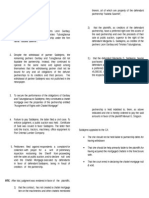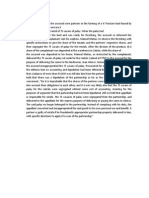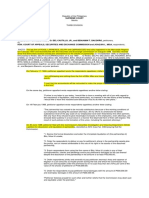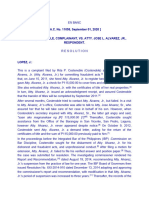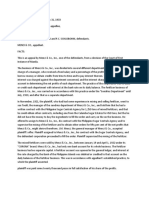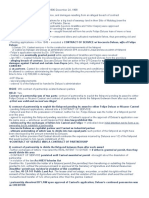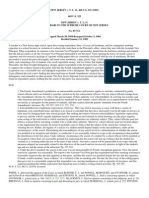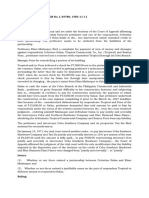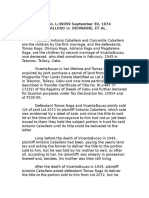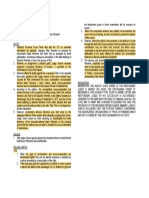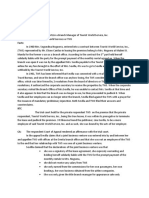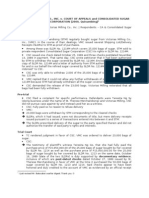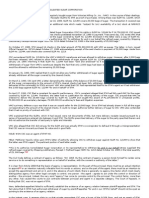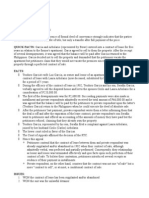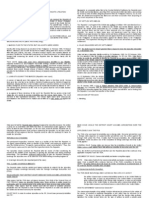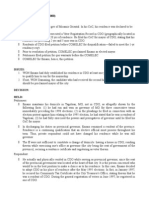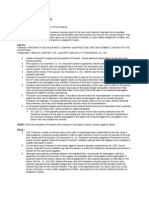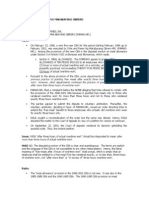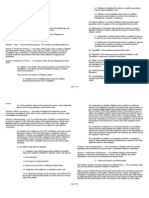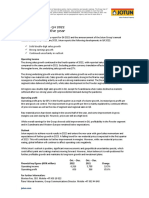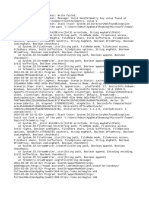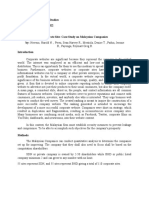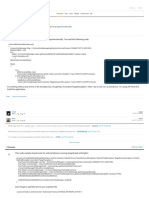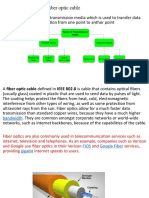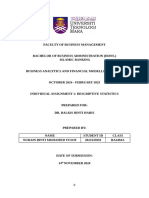41 Victorias Milling Co V CA
41 Victorias Milling Co V CA
Uploaded by
Miggy CardenasCopyright:
Available Formats
41 Victorias Milling Co V CA
41 Victorias Milling Co V CA
Uploaded by
Miggy CardenasOriginal Title
Copyright
Available Formats
Share this document
Did you find this document useful?
Is this content inappropriate?
Copyright:
Available Formats
41 Victorias Milling Co V CA
41 Victorias Milling Co V CA
Uploaded by
Miggy CardenasCopyright:
Available Formats
Victorias Milling Co., Inc. v CA and Consolidated Sugar Corporation [June 19, 2000] Ponente: Quisumbing, J.
Nature: Petition for review on certiorari of a decision of the CA RATIO DECIDENDI: The basis of agency is representation. On the part of the principal, there must be an actual intention to appoint or an intention naturally inferable from his words or actions; and on the part of the agent, there must be an intention to accept the appointment and act on it, and in the absence of such intent, there is generally no agency. One factor which most clearly distinguishes agency from other legal concepts is control; one person - the agent - agrees to act under the control or direction of another - the principal. Indeed, the very word "agency" has come to connote control by the principal. The law makes no presumption of agency. The existence of an agency relation should be viewed in the context of all circumstances. QUICK FACTS: STM sold its SLDR (Shipping List/Delivery Receipts) rights over 25,000 bags of sugar to Consolidated. Victorias only released 2,000 bags to Consolidated and refused to release the remaining 23,000 bags. The Court held that Consolidated was not estopped to sue as assignee because it was not an agent of STM. The letter of authority from STM indicating "for and in our (STM's) behalf" did not constitute sufficient proof so as to establish an agency relation between the parties. FACTS: Buyer: Consolidated Sugar Corporation (Consolidated) Seller: Victorias Milling Co. (Victorias) Facts St. Therese Merchandising (hereafter STM) regularly bought sugar from Victorias, who in turn, issued to STM Shipping List/Delivery Receipts (SLDRs) as proof of purchases. Among these was SLDR No. 1214M. October 16, 1989 - SLDR No. 1214M, which covers 25,000 bags of sugar, was issued. The transaction it covered was a "direct sale. October 25, 1989 - STM sold Consolidated its rights in SLDR No. 1214M for P 14,750,000.00. Consolidated issued checks in payment. Consolidated wrote Victorias that it had been authorized by STM to withdraw the sugar covered by SLDR No. 1214M. Enclosed in the letter were a copy of SLDR No. 1214M and a letter of authority from STM authorizing CONSOLIDATED "to withdraw for and in our behalf the refined sugar covered by SLDR No. 1214M in the total quantity of 25,000 bags. October 27, 1989 - STM issued 16 checks in the total amount of P31,900,000.00 with Victorias as payee.The said checks covered payment of 50,000 bags. Aside from SLDR No. 1214M, said checks also covered SLDR No. 1213 (an additional 25000 bags). Consolidated surrendered SLDR No. 1214M to Victorias warehouse and was allowed to 2000 bags of sugar. Thereafter, Victorias refused to allow further withdrawals of sugar against SLDR No. 1214M. January 23, 1990 - Consolidated then sent Victorias a letter informing the latter that SLDR No. 1214M had been "sold and endorsed" to it but that it had been refused
further withdrawals of sugar from petitioner's warehouse despite the fact that only 2,000 bags had been withdrawn. Consolidated thus inquired when it would be allowed to withdraw the remaining 23,000 bags. January 31, 1990 - Victorias replied that it could not allow any further withdrawals of sugar against SLDR No. 1214M because STM had already withdrawn all the sugar covered by the cleared checks. March 2, 1990 - Consolidated sent petitioner a letter demanding the release of the balance of 23,000 bags. March 9, 1990 - Victorias reiterated that all the sugar corresponding to the amount of STM's cleared checks had been fully withdrawn and hence, there would be no more deliveries of the commodity to STM's account. Victorias also noted that Consolidated had represented itself to be STM's agent as it had withdrawn the 2,000 bags against SLDR No. 1214M "for and in behalf" of STM. April 27, 1990 - CONSOLIDATED filed a complaint for specific performance. o Consolidated alleged: STM had fully paid petitioner for the sugar covered by SLDR No. 1214M. Victorias had no justification for refusing delivery of the sugar. Consolidated prayed that petitioner be ordered to deliver the 23,000 bags covered by SLDR No. 1214M. o Victorias alleged: Victorias was an unpaid seller for the 23,000 bags. Since STM had already drawn in full all the sugar corresponding to the amount of its cleared checks, it could no longer authorize further delivery of sugar to Consolidated. Victorias had no privity of contract with Consolidated. The SLDRs, which it had issued, were not documents of title, but mere delivery receipts issued pursuant to a series of transactions entered into between it and STM. Such SLDRs prescribed delivery of the sugar to the party specified therein and did not authorize the transfer of said party's rights and interests. Consolidated was STM's co-conspirator to defraud Victorias.
Trial Court Brought by Consolidated against Victorias. Action was for specific performance. The TC ordered Victorias to deliver to the plaintiff 23,000 bags of refined sugar due under SLDR No. 1214 and pay amounts for unrealized profits and damages. It based its decision on the testimony of Consolidateds witness Teresita Ng Go, that she had fully paid the purchase price (15,950,000 each) for the bags covered by SLDR No. 1213 and SLDR No. 1214 on the same date. The checks appear to have been honored and duly credited to the account of Victorias because Victorias then issued an official receipt no. 34734 in favor of St. Therese Merchandising for the amount of P31,900,000.00. Court of Appeals Victorias appealed. Affirmed but with modification. The Court modified the assailed judgment. Thereafter, both parties seasonably filed separate motions for reconsideration. The CA modified its earlier decision and ordered Victorias to deliver to Consolidated the 23,000 bags of refined sugar. The CA opined that the relation of agency is dependent upon the acts of the parties, the law makes no presumption of agency, and it is always a fact to be proved, with the burden of proof resting upon the persons alleging the agency, to show not only the fact of its existence, but also its nature and extent. Victorias failed to sufficiently establish the existence of an agency relation between Consolidated and STM. The fact alone that it (STM) had authorized withdrawal of sugar by plaintiff-appellee "for and in our (STM's) behalf" should not be eyed as pointing to the existence of an agency relation ...It should be viewed in the context of all the circumstances obtaining. The ambiguity of whether Consolidated was an agent was removed when Consolidated
informed Victorias that SLDFR No. 1214M had been "sold and endorsed" to it by STM. Further, Consolidated has shown that the 25, 000 bags of sugar covered by the SLDR No. 1214M were sold and transferred by STM to it ...A conclusion that there was a valid sale and transfer to Consolidated may, therefore, be made thus capacitating it to sue in its own name, without need of joining its imputed principal STM as co-plaintiff. ISSUES: 1. W/N Consolidated was an agent of STM and hence, estopped to sue upon SLDR No. 1214M as an assignee (*This issue was only raised on appeal. Nevertheless, the Court opted to address this issue as the CA did.) Buyer (Consolidated) says: It was not an agent but it became a buyer when STM sold its rights to the bags of sugar by [selling] and [endorsing] SLDFR No. 1214M to Consolidated. Seller (Victorias) says: Consolidated was an agent of STM because of the letter sent by STM authorizing Consolidated to withdraw for and in our [STM] behalf the refined sugar. Being a mere agent of STM, Consolidated has no capacity to sue Victorias for the delivery of the bags of sugar. 2. Whether the transactions entered into between Victorias and STM are but serial parts of one account or constituted independent transactions 3. Whether the sale of sugar was a contract of sale or contract to sell DECISION: Consolidated won. Petition is denied for lack of merit. HELD 1. No Contract of Agency The Civil Code defines a contract of agency as follows: "Art. 1868. By the contract of agency a person binds himself to render some service or to do something in representation or on behalf of another, with the consent or authority of the latter." The basis of agency is representation. On the part of the principal, there must be an actual intention to appoint or an intention naturally inferable from his words or actions; and on the part of the agent, there must be an intention to accept the appointment and act on it, and in the absence of such intent, there is generally no agency. One factor which most clearly distinguishes agency from other legal concepts is control; one person - the agent - agrees to act under the control or direction of another - the principal. Indeed, the very word "agency" has come to connote control by the principal. Victorias heavily relies upon STM's letter of authority allowing Consolidated to withdraw sugar against SLDR No. 1214M to show that the latter was STM's agent. The pertinent portion of said letter reads: "This is to authorize Consolidated Sugar Corporation or its representative to withdraw for and in our behalf the refined sugar covered by Shipping List/Delivery Receipt = Refined Sugar (SDR) No. 1214 dated October 16, 1989 in the total quantity of 25, 000 bags. In the instant case, it appears plain to us that Consolidated was a buyer of the SLDFR form, and not an agent of STM. Consolidated was not subject to STM's control. The question of whether a contract is one of sale or agency depends on the intention of the parties as gathered from the whole scope and effect of the language employed. That the authorization given to CONSOLIDATED contained the phrase "for and in our (STM's) behalf" did not establish an agency. Ultimately, what is decisive is the intention of the parties. That no agency was meant to be established by the Consolidated and STM is clearly shown by CONSOLIDATED's communication to petitioner that SLDR No. 1214M had been "sold and endorsed" to it. The use of the words "sold and endorsed" means that STM and
CONSOLIDATED intended a contract of sale, and not an agency. 2. The purchase of sugar covered by SLDR No. 1214M was a separate and independent transaction. Victorias insists that its debt has been offset by its claim for STM's unpaid purchases, pursuant to Article 1279 of the Civil Code. As the TC and CA ruled, Victorias had been paid for the sugar purchased under SLDR No. 1214M. It clearly had the obligation to deliver said commodity to STM or its assignee. Since said sugar had been fully paid for, Victorias and CONSOLIDATED, as assignee of STM, were not mutually creditors and debtors of each other. 3. Contract of sale SLDR No. 1214M contains the following terms and conditions: "It is understood and agreed that by payment by buyer/trader of refined sugar and/or receipt of this document by the buyer/trader personally or through a representative, title to refined sugar is transferred to buyer/trader and delivery to him/it is deemed effected and completed (stress supplied) and buyer/trader assumes full responsibility therefore The terms and conditions clearly show that petitioner transferred title to the sugar to the buyer or his assignee upon payment of the purchase price. Said terms clearly establish a contract of sale, not a contract to sell. Petitioner is now estopped from alleging the contrary. The contract is the law between the contracting parties. And where the terms and conditions so stipulated are not contrary to law, morals, good customs, public policy or public order, the contract is valid and must be upheld. Having transferred title to the sugar in question, petitioner is now obliged to deliver it to the purchaser or its assignee.
You might also like
- 18540750-Ford Tractor Workshop Repair Service Manual Pdf-1 PDFDocument174 pages18540750-Ford Tractor Workshop Repair Service Manual Pdf-1 PDFcesar100% (25)
- SANS1200DADocument15 pagesSANS1200DAFlavioMuhale100% (1)
- Singsong vs. SawmillDocument2 pagesSingsong vs. SawmillLilibeth Dee GabuteroNo ratings yet
- People Vs CamposDocument1 pagePeople Vs Camposracrabe0% (1)
- State Investment VS CaDocument3 pagesState Investment VS Cafermo ii ramosNo ratings yet
- Sps. Alcantara vs. Sps. Ruby G.R. No. 165133, April 19, 2010 ORIGINALDocument8 pagesSps. Alcantara vs. Sps. Ruby G.R. No. 165133, April 19, 2010 ORIGINALJacquelyn AlegriaNo ratings yet
- Lozana vs. Depakakibo: Case DigestDocument2 pagesLozana vs. Depakakibo: Case Digestfirmo minoNo ratings yet
- Litonjua V LitonjuaDocument9 pagesLitonjua V LitonjuaHudson CeeNo ratings yet
- Heirs of Maria Dela Cruz Vs CADocument1 pageHeirs of Maria Dela Cruz Vs CAmoyaaaeeeNo ratings yet
- ORTEGA VS CA - DigestDocument2 pagesORTEGA VS CA - DigestXing Keet LuNo ratings yet
- Lyceum of The Philippines vs. Ca 219 SCRA 610: FactsDocument2 pagesLyceum of The Philippines vs. Ca 219 SCRA 610: FactsOliver Reidsil M. RojalesNo ratings yet
- Bank of The Philippine Islands vs. Laingo, 787 SCRA 541Document2 pagesBank of The Philippine Islands vs. Laingo, 787 SCRA 541amareia yapNo ratings yet
- Sec Opinion - Sept 3 1984 PDFDocument2 pagesSec Opinion - Sept 3 1984 PDFRobin ScherbatskyNo ratings yet
- Angeles vs. PNR, G.R. No. 150128, August 31, 2006 DigestedDocument1 pageAngeles vs. PNR, G.R. No. 150128, August 31, 2006 DigestedJacquelyn AlegriaNo ratings yet
- 26 Costenoble v. Atty. Alvarez JR., A.C. No. 11058, September 1, 2020Document9 pages26 Costenoble v. Atty. Alvarez JR., A.C. No. 11058, September 1, 2020Lex LawNo ratings yet
- Rocha V Prats - Co.Document3 pagesRocha V Prats - Co.Cathy Belgira100% (1)
- C2 - 1 Pineda v. Dela RamaDocument2 pagesC2 - 1 Pineda v. Dela RamaAnonymous gzsN1pQRNo ratings yet
- Air France v. CaDocument2 pagesAir France v. CadelayinggratificationNo ratings yet
- Uy v. Puzon (G.R. No. L-19819)Document4 pagesUy v. Puzon (G.R. No. L-19819)Rache GutierrezNo ratings yet
- Case Name: John Dy v. People of The Philipines GR No. 158312 Date: November 14, 2008 By: Ruby U. Santillana Topic: Completion of BlanksDocument2 pagesCase Name: John Dy v. People of The Philipines GR No. 158312 Date: November 14, 2008 By: Ruby U. Santillana Topic: Completion of BlanksgiovanniNo ratings yet
- Jarantilla, Jr. vs. Jarantilla (G.R. No. 154486, Dec. 1, 2010)Document3 pagesJarantilla, Jr. vs. Jarantilla (G.R. No. 154486, Dec. 1, 2010)BryanNo ratings yet
- Moran JR VS CaDocument2 pagesMoran JR VS CaChantal NatanNo ratings yet
- Bastida v. Menzi and Co., G.R. No. L-35840 (1933)Document3 pagesBastida v. Menzi and Co., G.R. No. L-35840 (1933)Rianne SantosNo ratings yet
- DELUAO v. CASTEEL G.R. No. L-21906 December 24, 1968Document2 pagesDELUAO v. CASTEEL G.R. No. L-21906 December 24, 1968SSNo ratings yet
- 6 - Dionisio v. DionisioDocument1 page6 - Dionisio v. DionisioJasmine LeañoNo ratings yet
- Gozun v. Mercado (2006)Document1 pageGozun v. Mercado (2006)Kaulayaw PormentoNo ratings yet
- PNB vs. Lo Case DigestDocument1 pagePNB vs. Lo Case DigestPauline Mae AranetaNo ratings yet
- NEW JERSEY v. T. L. O.Document23 pagesNEW JERSEY v. T. L. O.gall4133No ratings yet
- Facts:: Metrobank v. CA, 194 SCRA 169Document7 pagesFacts:: Metrobank v. CA, 194 SCRA 169karlNo ratings yet
- Gonzalez v. Haberer, 47 Phil. 380 I BigcasDocument1 pageGonzalez v. Haberer, 47 Phil. 380 I Bigcascatrina lobatonNo ratings yet
- Evangelista Vs Abad SantosDocument2 pagesEvangelista Vs Abad SantosMaribel Nicole LopezNo ratings yet
- Tai Tong Chuache & Co. V. The Insurance Commission and Travellers Multi-IndemnityDocument8 pagesTai Tong Chuache & Co. V. The Insurance Commission and Travellers Multi-IndemnityRodeleine Grace C. MarinasNo ratings yet
- Agency Digest CasesDocument4 pagesAgency Digest Cases이설아No ratings yet
- Rule 40-56 Springfield v. RTCDocument3 pagesRule 40-56 Springfield v. RTCTheodore0176No ratings yet
- 153 - Rojas V MaglanaDocument2 pages153 - Rojas V MaglanaJai HoNo ratings yet
- Munasque Vs CADocument3 pagesMunasque Vs CAtopew04No ratings yet
- Government vs. Abadilla, 46 Phil. 642Document3 pagesGovernment vs. Abadilla, 46 Phil. 642bernadeth ranolaNo ratings yet
- Bicol Savings and Loan Association vs. Court of Appeals: - Second DivisionDocument4 pagesBicol Savings and Loan Association vs. Court of Appeals: - Second DivisionDorky DorkyNo ratings yet
- University of The Philippines College of Law: Litonjua V LitonjuaDocument3 pagesUniversity of The Philippines College of Law: Litonjua V LitonjuaSophiaFrancescaEspinosaNo ratings yet
- Caballero V Deiperine DigestDocument5 pagesCaballero V Deiperine DigestJJ CoolNo ratings yet
- Litonjua v. FernandezDocument6 pagesLitonjua v. FernandezCee LaurinoNo ratings yet
- Title X Agency: Nature, Form, and Kinds of AgencyDocument9 pagesTitle X Agency: Nature, Form, and Kinds of AgencyMedj Broke Law Student100% (1)
- ADILLE v. CA, Others: 2. (Art. 488, CC) - Article 1613 of The CodeDocument1 pageADILLE v. CA, Others: 2. (Art. 488, CC) - Article 1613 of The CodeluigimanzanaresNo ratings yet
- Case Digest 1Document11 pagesCase Digest 1Eilen Joyce BisnarNo ratings yet
- Lao v. Medel, A.C. No. 5916, July 1, 2003 PDFDocument7 pagesLao v. Medel, A.C. No. 5916, July 1, 2003 PDFAlan Jay CariñoNo ratings yet
- Cases Sept 9Document7 pagesCases Sept 9Jah JoseNo ratings yet
- Pascual vs. Cir 166 Scra 560Document5 pagesPascual vs. Cir 166 Scra 560FranzMordenoNo ratings yet
- Petition For Authority To Continue Use of The Name SyripDocument2 pagesPetition For Authority To Continue Use of The Name Syriplucky javellanaNo ratings yet
- Domingo V. Domingo: J. Makasiar - October 29, 1971Document4 pagesDomingo V. Domingo: J. Makasiar - October 29, 1971Camille BritanicoNo ratings yet
- Munasque-v-CA G-R-No-L-39780-November-11-1985Document2 pagesMunasque-v-CA G-R-No-L-39780-November-11-1985Christine Gel MadrilejoNo ratings yet
- People V. Seneris 99 SCRA 92 - August 6, 1980 Petitioner: The People of The Philippines Respondent: Hon. Alberto Seneris, Judge and Pilar Pimentel (Rule 132, Sec. 6 - Cross-Examination) FactsDocument1 pagePeople V. Seneris 99 SCRA 92 - August 6, 1980 Petitioner: The People of The Philippines Respondent: Hon. Alberto Seneris, Judge and Pilar Pimentel (Rule 132, Sec. 6 - Cross-Examination) FactsMayr TeruelNo ratings yet
- PALE Additional Cases 1 14Document25 pagesPALE Additional Cases 1 14Kris HannahNo ratings yet
- GUILLERMO-Vda. de Chua vs. IAC (Lease)Document1 pageGUILLERMO-Vda. de Chua vs. IAC (Lease)PATRICIA MAE GUILLERMONo ratings yet
- Sevilla vs. CADocument3 pagesSevilla vs. CAEarlcen MinorcaNo ratings yet
- Eligio Catalan, Movant and Appellee, vs. Ramon Gatchalian, Oppositor and AppellantDocument10 pagesEligio Catalan, Movant and Appellee, vs. Ramon Gatchalian, Oppositor and AppellantJ.C. S. MaalaNo ratings yet
- Home Insurance Co. v. USLDocument1 pageHome Insurance Co. v. USLWinterBunBunNo ratings yet
- Classification of Agency PDFDocument11 pagesClassification of Agency PDFIffah FirzanahNo ratings yet
- Victorias Milling v. CA DigestDocument4 pagesVictorias Milling v. CA DigestGian MarquezNo ratings yet
- Victorias Milling Vs CADocument1 pageVictorias Milling Vs CAShiela BasadreNo ratings yet
- Victorias Milling Co. V CA (Digest)Document1 pageVictorias Milling Co. V CA (Digest)mansikiaboNo ratings yet
- Case Number 67 Victoria Milling v. CADocument3 pagesCase Number 67 Victoria Milling v. CAjuhrizNo ratings yet
- Victorias Milling Vs CA Consolidated Sugar Corp G R No 117356 June 19 2000 DIGESTEDDocument2 pagesVictorias Milling Vs CA Consolidated Sugar Corp G R No 117356 June 19 2000 DIGESTEDdemsanpedroNo ratings yet
- 19 Bowe vs. CADocument2 pages19 Bowe vs. CAMiggy CardenasNo ratings yet
- Hilao V MarcosDocument3 pagesHilao V MarcosMiggy CardenasNo ratings yet
- Southwest Africa CaseDocument1 pageSouthwest Africa CaseMiggy CardenasNo ratings yet
- 215 Sambarani v. ComelecDocument3 pages215 Sambarani v. ComelecMiggy CardenasNo ratings yet
- MBTC V PbcomDocument6 pagesMBTC V PbcomMiggy CardenasNo ratings yet
- Summary of El Salvador v. HondurasDocument19 pagesSummary of El Salvador v. HondurasMiggy CardenasNo ratings yet
- 88 People v. NG Yik BunDocument2 pages88 People v. NG Yik BunMiggy CardenasNo ratings yet
- Guijarno V CIRDocument2 pagesGuijarno V CIRMiggy CardenasNo ratings yet
- Panay Electric v. NLRCDocument3 pagesPanay Electric v. NLRCMiggy CardenasNo ratings yet
- Torayno v. ComelecDocument2 pagesTorayno v. ComelecMiggy CardenasNo ratings yet
- Pilipino Telephone Corp v. PILTEADocument3 pagesPilipino Telephone Corp v. PILTEAMiggy CardenasNo ratings yet
- 248 Ordillo v. ComelecDocument3 pages248 Ordillo v. ComelecMiggy CardenasNo ratings yet
- 04 Fireman's Fund v. JamilliaDocument1 page04 Fireman's Fund v. JamilliaMiggy CardenasNo ratings yet
- 3 Peza V AlikpalaDocument2 pages3 Peza V AlikpalaMiggy CardenasNo ratings yet
- 17 Stronghold v. CADocument2 pages17 Stronghold v. CAMiggy CardenasNo ratings yet
- DOLE v. Pawis NG MakabayanDocument2 pagesDOLE v. Pawis NG MakabayanMiggy CardenasNo ratings yet
- 52 CIR V LedesmaDocument4 pages52 CIR V LedesmaMiggy CardenasNo ratings yet
- Paras V ComelecDocument1 pageParas V ComelecMiggy CardenasNo ratings yet
- Phoshorus Xsys0015 CDocument4 pagesPhoshorus Xsys0015 CAniket DubeyNo ratings yet
- GM340 BrochureDocument2 pagesGM340 BrochureKees_HNo ratings yet
- S. No. Major Head 1 Minor Head 1Document49 pagesS. No. Major Head 1 Minor Head 1ankit_gadiya24No ratings yet
- 5152Document4 pages5152yadhu krishnanNo ratings yet
- The Impact of Covid 19 On Businesses and PDFDocument3 pagesThe Impact of Covid 19 On Businesses and PDFGauvry NjrNo ratings yet
- Unit 3. Where Do You LiveDocument32 pagesUnit 3. Where Do You LiveQuỳnh ViNo ratings yet
- NSE Finmahotsav BrochureDocument16 pagesNSE Finmahotsav BrochureImmortal ProNo ratings yet
- RR IndustriesDocument3 pagesRR IndustriesshinestarcoatersNo ratings yet
- Grants To IndividualsDocument37 pagesGrants To IndividualsPhilonious Phunk100% (1)
- RA 6735 Initiative and Referendum ActDocument5 pagesRA 6735 Initiative and Referendum ActMark Aaron Delos ReyesNo ratings yet
- Barge ContainerDocument6 pagesBarge Containerrahmat100% (1)
- 2022 q4 Jotun Quarterly UpdateDocument1 page2022 q4 Jotun Quarterly UpdateyasanuNo ratings yet
- Market Share Analysi 746549 NDXDocument25 pagesMarket Share Analysi 746549 NDXfrleelilyNo ratings yet
- SquirrelSetup Varad HingeDocument9 pagesSquirrelSetup Varad HingeArvind HingeNo ratings yet
- Case Study On Malaysian CompaniesDocument2 pagesCase Study On Malaysian CompaniesAldinNo ratings yet
- Learning in The World Café - An Empirical EvaluationDocument14 pagesLearning in The World Café - An Empirical Evaluationgkrz4f8cjcNo ratings yet
- MOU Acorn - Bell 1Document2 pagesMOU Acorn - Bell 1Bell InstituteNo ratings yet
- Psychosocial Factors Linked To The Occupational Psychological Health of Police Officers Preliminary StudyDocument11 pagesPsychosocial Factors Linked To The Occupational Psychological Health of Police Officers Preliminary Studyfarmaciasalvadora86No ratings yet
- SEC 2022 E 05 (Rev)Document4 pagesSEC 2022 E 05 (Rev)Ada Derana100% (2)
- Enable & Disable Data Connection in Android Programmatically - Stack Overflow PDFDocument5 pagesEnable & Disable Data Connection in Android Programmatically - Stack Overflow PDFShoaib QuraishiNo ratings yet
- DELEGATIONDocument20 pagesDELEGATIONCathleen BethNo ratings yet
- Magpro BrochureDocument20 pagesMagpro BrochuresabiuNo ratings yet
- Malaysia: Lim Goh TongDocument28 pagesMalaysia: Lim Goh TongShanmugapriya SundramuthiNo ratings yet
- Fiber Optic CableDocument41 pagesFiber Optic CableAbhishek gargNo ratings yet
- Insecticide Resistance PDFDocument4 pagesInsecticide Resistance PDFVarun VarnaNo ratings yet
- vande Bharat Express Chair Car (CC)Document2 pagesvande Bharat Express Chair Car (CC)jordanrai183No ratings yet
- LEAFLETDocument11 pagesLEAFLETijlal maerNo ratings yet
- Fin534 Individual Assignment 1Document30 pagesFin534 Individual Assignment 1nurainyusof21No ratings yet


